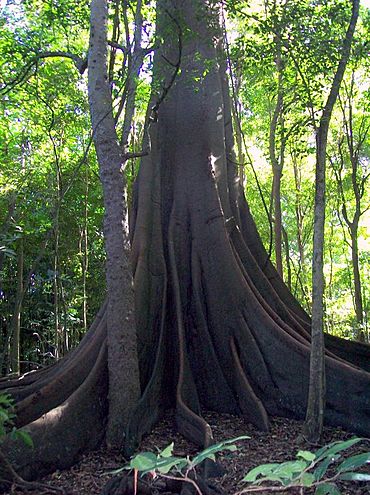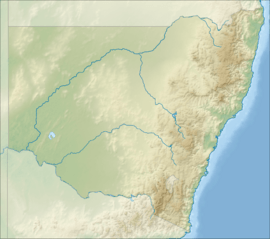Wingham Brush Nature Reserve facts for kids
Quick facts for kids Wingham Brush Nature ReserveNew South Wales |
|
|---|---|
|
IUCN Category IV (Habitat/Species Management Area)
|
|

Moreton Bay fig, located in the reserve
|
|
| Nearest town or city | Wingham |
| Established | July 2000 |
| Area | 0.08 km2 (0.0 sq mi) |
| Managing authorities | NSW National Parks and Wildlife Service |
| Website | Wingham Brush Nature Reserve |
| See also | Protected areas of New South Wales |
The Wingham Brush Nature Reserve is a special protected area, like a nature park, located on the Mid North Coast of New South Wales, Australia. This reserve is about 8 hectares (which is like 8 football fields) and is a rare example of a lowland subtropical rainforest. It sits right next to the Manning River.
Contents
What Makes Wingham Brush Special?
Most of Australia's lowland subtropical rainforests were cleared long ago for homes and farms. This makes places like Wingham Brush very important because they are some of the last small patches left. The soil here is very rich because it comes from the Manning River. This soil gets extra nutrients from basalt rocks found upstream at places like Barrington Tops. On average, Wingham gets about 1,100 millimeters of rain each year.
Amazing Animals of the Rainforest
You'll find many cool animals living in the Wingham Brush rainforest.
- The most noticeable mammal is the grey-headed flying fox, which is a type of large bat.
- Many other kinds of bats also live here.
- Some interesting birds you might spot include the osprey, green catbird, wompoo fruit-dove, and the brush turkey.
- At night, you might see gliders and possums moving through the trees.
- There are also many types of reptiles, like the land mullet, which is a large lizard.
Cool Plants and Trees
The reserve is home to 76 different kinds of trees!
- The biggest and most famous trees at Wingham Brush are the huge Moreton Bay fig trees.
- Another very common plant is the giant stinging tree. Be careful, as touching it can cause a sting!
- The tallest known blush walnut tree here was measured at 37 meters tall. Its base was over a meter wide!
- Other important trees include the white cedar, black apple, white walnut, shiny-leaved stinging tree, native elm, hairy rosewood, and black booyong.
Helping the Rainforest Grow Back
For a long time, the rainforest at Wingham Brush was covered in harmful weeds. These weeds were stopping the native rainforest plants from growing. In 1980, local people decided to do something about it. They started programs to remove the weeds and help the native rainforest species grow back.
- Two very damaging weeds were the Madeira vine and the cats claw creeper.
- After a lot of hard work, the area that was once damaged became a beautiful, healthy rainforest again.
- The way they helped the rainforest grow back at Wingham Brush is now known as the "Wingham Brush method." It's a special technique for rainforest recovery that is recognized around the world!
First Peoples of the Land
The word Wingan comes from the local Biripi Indigenous language. It means "where bats come to drink," which makes sense given how many flying foxes live here! Indigenous Australians have visited this rainforest for a very long time. They used it for many important things:
- Collecting food
- Finding plants for medicine
- Gathering fibers to make bags and nets
- Holding social gatherings
The rainforest is also a very spiritual place for the local Indigenous people.
Gallery
-
Giant stinging trees at Wingham Brush
-
Native elm at Wingham Brush
-
Black apple beside the boardwalk at Wingham Brush
-
Red kamala at Wingham Brush
 | Calvin Brent |
 | Walter T. Bailey |
 | Martha Cassell Thompson |
 | Alberta Jeannette Cassell |






